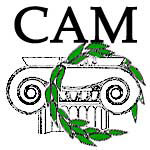About CAM
The Classical Association of Minnesota (CAM) was founded in 1981. Its purpose is to promote interest in the study of the classical languages and of other aspects of Greco-Roman antiquity in the schools, colleges and universities of the region and, through an active organization for teachers, to help students of the classics obtain the maximum benefit from their courses.
Every teacher of Classics in the state of Minnesota is considered a member of CAM. Others interested in the Classics may become members by declaring their interest to any officer.
CAM sponsors an annual meeting for both its members and the general public that includes a nationally prominent speaker on a Classical topic.
CAM Officers, 2024–2026
VP: Travis Hill, Parnassus Preparatory School
Secretary: Betsy Bixby, Agape Christi Academy
Treasurer: Krista Osmundson, College of St. Benedict/St. John’s University
Member-at-Large: Clara Hardy, Carleton College
Website Managers: Kyle Helms & Anne Groton, St. Olaf College
Constitution of the
Classical Association of Minnesota
ARTICLE I
All previous constitutions and by-laws, if any, of state classical associations of Minnesota (such as The Minnesota Classical Conference) are hereby superseded.
ARTICLE II
The name of this association shall be The Classical Association of Minnesota. Its purpose shall be to promote interest in the study of the classical languages and of other aspects of Greco-Roman antiquity in the schools, colleges and universities of the region and, through an active organization for teachers, to help students of the classics obtain the maximum benefit from their courses.
ARTICLE III
Every teacher of Latin and/or Greek resident or employed in the state of Minnesota shall be considered a member of this association. Those paying dues shall be known as supporting members. Other persons [“in Minnesota” stricken by unanimous vote of CAM members at annual meeting, October 24, 1998] interested in the classics may become members by declaring to any officer their interest in the purpose of the association and by paying the annual dues. All members present at the annual meeting shall be known as constituent members and shall have the right to vote.
ARTICLE IV
The elective officers of the association shall be a President, a Vice-President, a Secretary, and a Treasurer. They shall be elected biennially. All may succeed themselves in office except the President. The four officers, together with the retiring President and one member-at-large shall constitute the Executive Council and as such shall have full power in the interval between general meetings to perform all functions which the association itself might perform, except the power to amend this constitution. The duties of the officers individually shall be those which usually pertain to their offices. The President shall take responsibility for the program at the annual meeting, but may call upon the Council members for assistance. The President shall appoint all necessary committees with the advice and approval of the Council, but the Council shall itself nominate its successors. This last provision, however, shall not preclude nominations from the floor at the general meeting. The Executive Council may, when necessary, delegate any of its powers to the President. The Vice-President shall be responsible for publicity and promotion. The Secretary shall edit the newsletter.
ARTICLE V
The amount of annual dues shall be recommended to the general meeting each year by the Executive Council, and shall be voted upon by all the members at this time.
ARTICLE VI
The association shall hold an annual meeting at a time and place to be decided by the Executive Council and to be announced to all the members at least three weeks in advance. The Executive Council shall meet at least once a year at a time and place to be announced by the President.
ARTICLE VII
Robert’s Rules of Order, Revised shall govern this association in all cases to which these rules apply and in which they do not conflict with other rules passed by the membership.
ARTICLE VIII
This constitution may be amended by a two-thirds vote at any business meeting of this association, provided that a copy of the proposed amendment shall have been included in the notice of the annual meeting sent out to all members as provided in Article VI.
ARTICLE IX
This constitution shall take effect and be in force immediately after being approved by a two-thirds vote of the members present at the annual meeting for 1981, provided that copies thereof shall have been included in the notice of the meeting sent to all members.
ARTICLE X
After adoption, this constitution shall be signed by all the officers serving at the time of its adoption, and the signed copy together with all amendments and by-laws, passed from time to time, shall be kept in the custody of the Secretary. A copy of this constitution and of all amendments and by-laws as passed from time to time shall be placed in the Archives Division of the Library of the University of Minnesota.
SIGNED THIS 31ST DAY OF OCTOBER, 1981
